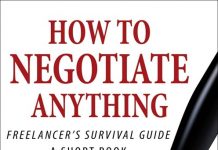I have heartily enjoyed the recent dialogue we’ve been having on self-publishing versus legacy publishing. I read Michael Kozlowski’s two essays on the topic with interest, and was delighted to see him pop over to join the discussion.
I think that what might be blocking some people on really seeing the angles of this issue is the unfortunate Special Snowflake Syndrome that often seems to affect any business that is book-related.
Whenever a critic takes on a flaw in the self-publishing model, the claws come out that Books are Special, and how dare we put up barriers that might prevent a Great Work of Literature from being put out there! And there is some validity to that—maybe one percent of the argument—but the reality is that most self-publishers would do much better, from a financial and business point of view, if they de-romanticized their work a little and treated them more like products and less like special babies.
 So, if you replace the word ‘book’ with the word ‘widget,’ does the argument change? Let’s consider another industry with both public and private tiers—the education industry.
So, if you replace the word ‘book’ with the word ‘widget,’ does the argument change? Let’s consider another industry with both public and private tiers—the education industry.
In my province, the public education system (let’s call them the legacy publisher) is heavily regulated. Even a teacher with proper credentials and suitable work experience may not be able to crack it because a combination of few jobs and a heavily unionized workforce makes it extremely difficult for newbies to get in without a connection. Even someone like me, who has an in-demand special qualification and a few perhaps-connections can take years to even get a foot in—I’ve had school principals tell me to call them once I get on the ‘list’ (a fabled roster of those who are ‘eligible to be hired’ for contract work). And, as I have not yet cracked this mythical list, they are unable, at the moment, to help me.
Meanwhile, the magazine of the Ontario College of Teachers regularly conducts membership surveys and has routinely reported that private schools (let’s call them the indie publishers) are the number one employer of teachers new to the profession. The pay is less, the benefits not as generous or secure, and the contracts generally are year-to-year and thus can be ended on a whim. But it is a much easier market for a job-seeker to crack because there are fewer barriers. There isn’t a gatekeeper you must go through in order to access a point of entry—you can apply straight to someone who can make this happen for you.
At my own school, teachers are certainly expected to be properly qualified and certified. But that is a hiring standard my principal adheres to voluntarily. Other than a few licensing issues such as location of fire exits and height of playground equipment, there is very little the province officially requires from them.
So, perhaps unfairly, a perception can arise where one assumes that all of these rigorously vetted teachers in the board are the better ones, and that the private schools, with their more relaxed hiring practices, are full of teachers who are only there because they couldn’t get into the public system. And, from a sheer economic standpoint, that is perhaps true. The board does have better pay and incredible benefits. The private schools are an easier market to break into for a newbie…
But of course, as anyone who has experience with kids can tell you, not all private school teachers are terrible. Indeed, most of my colleagues are passionate, qualified and talented people. They have to be—unlike their union-protected brethren in the public boards, they can be fired if they do a bad job. And as for the money aspect, an outside-the-box thinker can make some of that up, the same way a good self-publisher can earn more on his own than a mediocre legacy one. (Many of my colleagues tutor, I myself run an after-school enrichment program for which I charge… )
So, to bring this back to the books again, I think that what we’re seeing when we take out the romanticism of ‘ooooh, books!’ is a similar paradigm. Some people do enter the private (self-pub) system because they can’t get into the public (legacy) one. But not everybody published by the legacy model makes money, just as not every self-pubber doesn’t. And being a legacy-published book doesn’t guarantee you won’t be a clunker.































